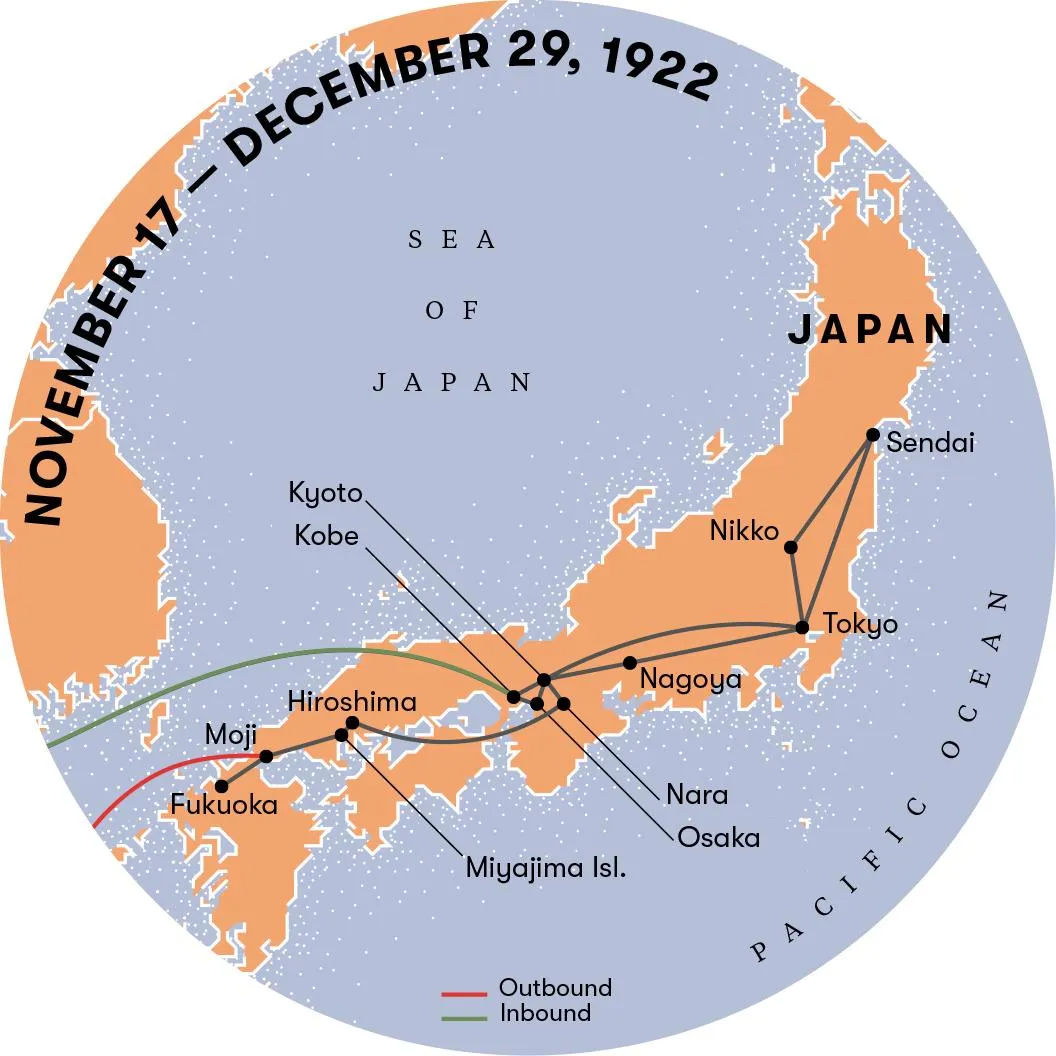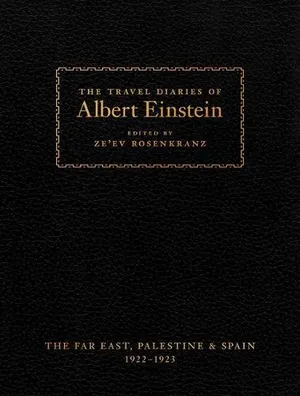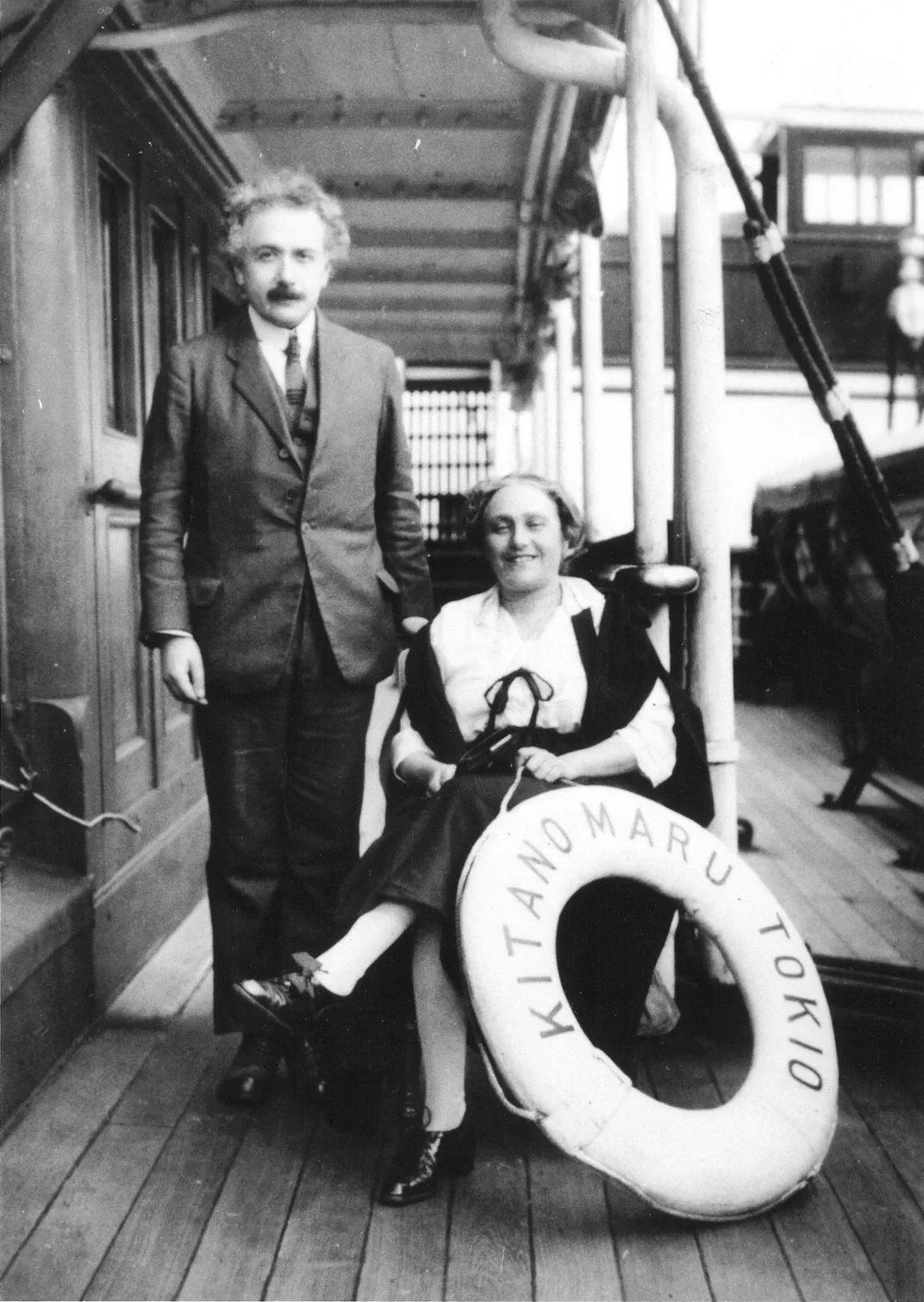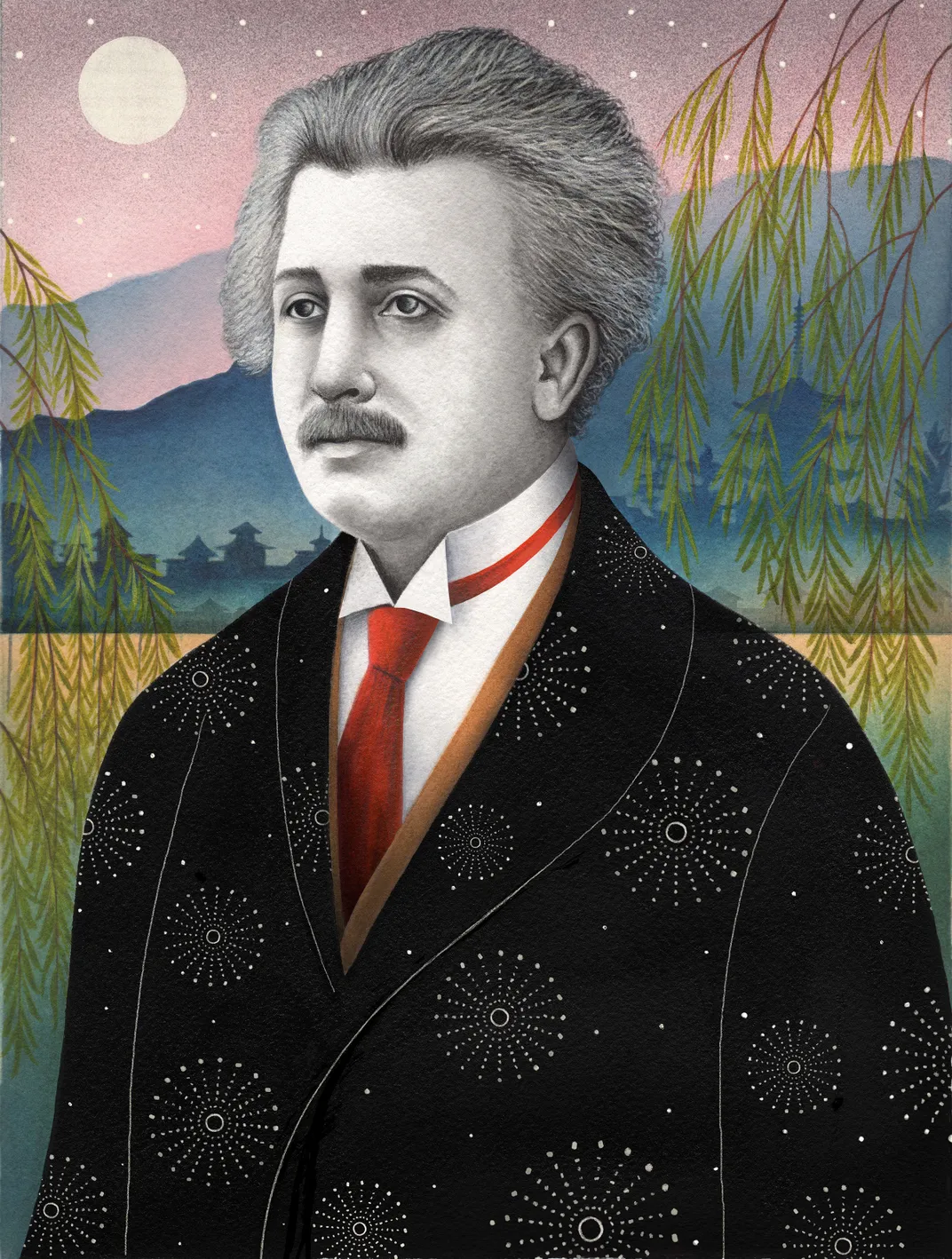When Albert Einstein Visited Japan
As he traveled through Asia, including a trip to Palestine, the brilliant scientist discovered much he didn’t understand
/https://tf-cmsv2-smithsonianmag-media.s3.amazonaws.com/filer/99/f9/99f9d925-7591-41b2-a872-a145e3e93ea8/einstein_in_japan_1922.png)
On his first and only visit to Japan, in the late fall of 1922, Albert Einstein, like almost every Westerner who ever set foot there, was wowed by the beauty of the country and the refinement of the culture. “The inner palace courtyard is among the most exquisite architecture I have ever seen,” he wrote in his diary about Kyoto. The Japanese are “pure souls as nowhere else among people.” The populace was equally impressed by their visitor, greeting him on his arrival in Kobe with “great hubbub. Masses of journalists on board the ship. Half-hour interview in the saloon. Disembarkation with huge crowds.” Einstein was, after all, not just the era’s best-known scientist, but arguably the most famous person in the world.
On October 8, 1922, Einstein and his wife, Elsa, had sailed from Marseille aboard the Japanese ocean liner SS Kitano Maru to begin a nearly six-month trip that would take them to Egypt, Ceylon (modern-day Sri Lanka), Singapore, Hong Kong and China before arriving in Japan on November 17. Their return, aboard the SS Haruna Maru and SS Ormuz, would include extended visits to Palestine and Spain before arriving back in Berlin on March 21, 1923. Throughout his journey, Einstein kept a diary. It will be published in English in its entirety for the first time this May as The Travel Diaries of Albert Einstein: The Far East, Palestine and Spain, 1922-1923, with annotations by the Einstein scholar Ze’ev Rosenkranz.
The handwritten diary shows Einstein in an unfamiliar light, as a tourist—in the real, earthbound sense, not (as in his famous thought experiment) riding a light beam through space-time. Never intended for publication, it records his thoughts and impressions as they occurred, unmediated and unfiltered by considerations of how they would affect his image. So we can be sure he was speaking from the heart when he wrote, after being transported by sweating rickshaw runners in Ceylon: “I was very much ashamed of myself for being complicit in such despicable treatment of human beings but couldn’t change anything.” He finds a dinner with “diplomats and other big shots” at the German Embassy in Tokyo “boring and stuffy.” And like any overbooked traveler the great man gets worn out. “I was dead,” he noted after a day of banquets and receptions, “and my corpse rode back to Moji where it was dragged to a children’s Christmas and had to play violin for the children.” We also see some qualities that stamped him as a creature of his time, such as the ingrained assumption of the intellectual superiority of Europeans: “It seems that the Japanese never thought about why it is hotter on their southern islands than on their northern islands. Nor do they seem to have become aware that the height of the sun is dependent on the north-south position. Intellectual needs of this nation seem to be weaker than their artistic ones—natural disposition?”
The Travel Diaries of Albert Einstein: The Far East, Palestine, and Spain, 1922–1923
In the fall of 1922, Albert Einstein, along with his then-wife, Elsa Einstein, embarked on a five-and-a-half-month voyage to the Far East and Middle East, regions that the renowned physicist had never visited before.
Einstein’s visit to Japan was the heart of his trip. The island was still an exotic destination for Westerners nearly 70 years after Commodore Matthew Perry sailed his U.S. fleet into Edo Bay, and Einstein was deeply impressed by Japanese culture, even when he didn’t understand it. “Japanese singing remained so entirely incomprehensible to me,” he wrote. “Yesterday I heard another one singing away again to the point of making me dizzy.” He may not have thought much of Japanese science, but he had complimentary things to say about the architecture and art, and he applauded the people for their “earnest respect without a trace of cynicism or even skepticism”—the latter an odd quality to have won praise from Einstein, who was a thoroughgoing skeptic about all forms of received wisdom, from biblical to Newtonian. He also liked Japanese women—actually, he liked the women pretty much everywhere he went—although he was uncharacteristically tight-lipped about what he saw in them: “On the exquisiteness of the Japanese woman, this flower-like creature—I have also remained reticent; for here the common mortal must cede the word to the poet.”
Like any hapless Westerner he tried, with varying success, to adapt to the customs. “Sitting on the floor difficult,” he wrote after a meal at a Japanese inn. He sampled the cuisine, which didn’t always sit well with his digestion or his ethics—“poor creatures,” he said of the roasted lobsters he was served at the “charming establishment.” And, echoing a familiar trope of his era, one in which national and ethnic generalizations were treated as matter-of-fact observations, not politically fraught stereotypes, he found the Japanese, yes, inscrutable. “Among us we see many Japanese, living a lonely existence, studying diligently, smiling in a friendly manner,” he wrote. “No one can fathom the feelings concealed behind this guarded smile.”
**********
Long before he set foot in Japan, Einstein had a strong affinity for the country. “The invitation to Tokyo pleased me a great deal, as I have been interested in the people and culture of East Asia for a long time,” he wrote. For Japan, Einstein’s visit lent a powerful impetus to its effort to be recognized as a modern world power. A year earlier, the same publishing house that arranged Einstein’s visit had brought over the philosopher Bertrand Russell, and asked him to name the three greatest living citizens of the world. “First Einstein, then Lenin,” Russell is said to have replied. “There is nobody else.” That was an interesting pairing, since right around the time Einstein was arriving in Japan to plaudits, the Soviet Union decided that his theory of relativity was, as a headline in the New York Times put it, “‘Bourgeois’ and Dangerous.”
In Japan, thousands packed auditoriums to hear him expound on his theory of relativity for three or four hours at a stretch, in remarks laboriously translated from German. It had been three years since Sir Arthur Eddington confirmed the bending of starlight as it passed by the Sun, a key prediction of Einstein’s 1915 theory of general relativity, which explained gravity as a distortion of space-time. It followed his revolutionary 1905 paper on special relativity, which laid the groundwork for his equation for mass-energy equivalence: E=mc2.
Instantly recognizable with his full head of curly hair, pipe and mustache, he yearned for the occasional snatches of solitude. A journal entry on December 24, about a week before his departure from the country, notes: “Photographed for the 10,000th time...dinner that almost lasts forever...the hostess of the inn is deeply thrilled and, on her knees, bows her head to the ground around 100 times.” It was, presumably, from his own experience as a living legend that he wrote: “Emperor [has] status of a god; for him very uncomfortable.”
Einstein’s German birth and upbringing rendered him suspect in the eyes of some European countries just a few years after the end of the world war—a lecture in Paris scheduled for April was canceled when French academics threatened a boycott over ongoing political disputes—but the Japanese had no dispute with Germany and were welcoming of his ideas.
And for Einstein, Japan was refreshingly free of anti-Semitism. Einstein did not practice his religion, but he made no apologies for it, and had become increasingly involved in Zionism since the war. But in Germany in 1922, being a famous Jewish scientist came with risks. Earlier in the year another prominent German Jew, the foreign minister Walther Rathenau, had been assassinated by right-wing thugs (earning the praise of a Nazi Party member named Adolf Hitler). “I am supposedly among the group of persons being targeted by nationalist assassins,” Einstein wrote to the physicist Max Planck.

Einstein had been advised to postpone his trip by physicist Max von Laue who wrote just a few weeks before his departure, “According to reliable news I received yesterday, events could be taking place in November that would make your presence in Europe in December desirable.” Einstein knew what he was referring to. Svante Arrhenius, a member of the Royal Swedish Academy of Sciences, had also hinted to Einstein that he would be awarded the 1921 Nobel Prize in Physics, but Einstein had declined to change his plans. He received official news of the award by telegram in Shanghai on November 13. His diary entry the next day makes no mention of the honor. Instead, he describes the scenery—“Travel upriver along flat, picturesque, yellowish-green illuminated shores”—and the “comical reciprocal staring” between the curious travelers and the surprised residents they encountered.
As it happened, Einstein didn’t even win his Nobel for the work that earned him the most fame—relativity—but for a 1905 paper on the photoelectric effect. And though he worked diligently on new ideas during his trip, writing to Arrhenius: “How conducive to thinking and working the long sea voyage is—a paradisiacal state without correspondence, visits, meetings, and other inventions of the devil!”, his best work was behind him. Now he set himself the task of reconciling the mathematics of the two great macro-scale forces that rule the universe, gravity and electromagnetism—a challenge that, nearly a century later, remains one of the great unsolved problems of science. At various times during his voyage he believed he had succeeded, only to conclude, as he did in January, during a stopover in Malacca, “Discovered large fly in my electricity ointment in the afternoon. A pity.”
**********
Einstein spent most of January at sea, arriving at Port Said, Egypt, on February 1, and the next day he was in Jerusalem, which represented a test of his distinctly secular brand of Zionism. Einstein was unmoved by the Wailing Wall, where, he wrote, unkindly, “obtuse ethnic brethren pray loudly, with their faces turned to the wall, bend their bodies to and fro in a swaying motion. Pitiful sight of people with a past but without a present.” But he was impressed by Tel Aviv, a “[m]odern Hebrew city stamped out of the ground with lively economic and intellectual life...The accomplishments by the Jews in but a few years in this city excite the highest admiration....What an incredibly lively people our Jews are!” Jericho represented “a day of unforgettable magnificence. Extraordinary enchantment of this severe, monumental landscape with its dark, elegant Arabian sons in their rags.”
Although Palestine, and later the State of Israel, would remain a passion of Einstein’s for the rest of his life, the impression left by his travel diaries and letters is that Japan interested him more. In an essay published in 1923, he contrasted Western culture with that of Japan, the former characterized by “individualism in the extreme, cut-throat competition exerting one’s utmost energy, feverish laboring to acquire as much luxury and indulgences as possible,” the latter by harmony and equanimity, strong family bonds and public civility enforced by social norms. He ended on a note of warning: “The Japanese rightfully admires the intellectual achievements of the West and immerses himself successfully and with great idealism in the sciences. But let him not thereby forget to keep pure the great attributes in which he is superior to the West—the artful shaping of life, modesty and unpretentiousness in his personal needs, and the purity and calm of the Japanese soul.”
It was less than a decade later that the purity and calm of the Japanese soul was crushed by the spirit of militarism that led to the invasion of Manchuria. Einstein, forced out of Germany by the Nazis, became honorary chairman of the U.S. War Resisters League. His suggestion for ending the fighting was for the leading Western powers to threaten Japan with an economic boycott, which he was certain would work. Instead, the war that drew in his adopted country and sunk the Japanese ships he had sailed on ended only with the deployment of a bomb whose awful power derived from the very law Einstein had set down years ago as a clerk in the Swiss patent office: E=mc2.
A Note to our Readers
Smithsonian magazine participates in affiliate link advertising programs. If you purchase an item through these links, we receive a commission.


